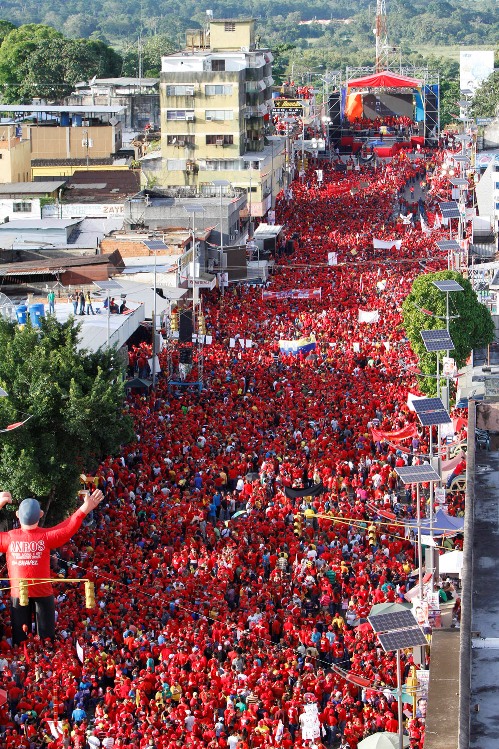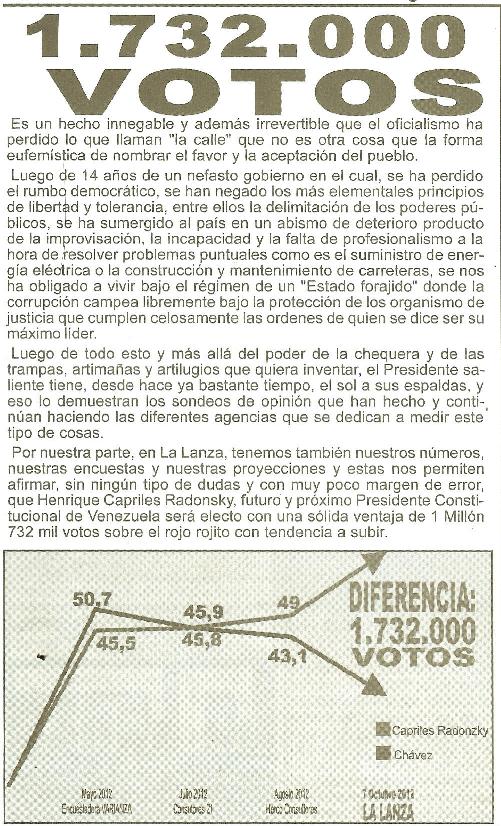
Venezuela's "Red Tsunami" returns to the streets to defend the revolution at one of President Chávez' many campaign visits throughout the country.
Venezuela's presidential election is only 7 days away and it will be the most exciting and critical election in Venezuela's history. The excitement is palpable. I have visitors in my home this month who have come down from the United States to experience it for themselves. One of my visitors, a young woman (21) has been to some of the campaign turnouts on both sides and when she presented in our radio program last Saturday was asked to compare the youth in US elections with this one in Venezuela:
"To me, the most noticeable difference in campaigning here and in the US is the strong youth presence. Here, everyday we see young people in the streets, singing & dancing, urging others to vote for a certain candidate. In the US there is some youth activism but it is very little and almost nonexistent compared with what I see here. Here, the youth are excited and engaged in the campaigns and in the entire political process."
In the October 1 video presented at the end of my report, Jorge Rodríguez, Campaign Manager for Hugo Rafael Chávez Frías, provides the latest polls on the 7 October presidential elections in Venezuela. These polls are based on Venezuelans reporting their intention to vote for the two candidates, President Chávez and Capriles Radonski. This report compares those polls with what we see in the opposition and corporate media in the U.S. and Europe.
Opposition's "Plan B"
See:
What has come to be known as the opposition's "Plan B" is their alternative to winning this election democratically. As we approach the election, only 7 days away, the opposition's "Plan B" becomes more and more transparent. First and foremost, none of the opposition leaders have agreed to sign the document stating that they will accept the results reported by the Electoral Council (CNE).
Venezuelan Elections. Opposition disdain for the people and "Plan B." by Arturo Rosales in Caracas, Axis of Logic
We have interviewed numerous members of the opposition and to the last one, they express complete confidence that Radonski will win the election by about 2 million votes. They have been convinced of this by their leaders and the opposition media.
Earlier this week, Mario Silva, political analyst and host of TV program, "La Hojilla" (The Razorblade) revealed a plan for opposition parties to scan and send to Washington, selected results of the "Actas," i.e. the immediate results of some election centers (which are by law provided to all political parties). The alleged plan is for the opposition and western media to then declare a Radonski victory ahead of the CNE declaration of the results. The source of this plan was attributed to leaks from within the opposition.
Plan B begins with building the hopes of their electorate by publishing propaganda of an impending Radonski victory and then to cry fraud when the CNE reports results of another Chávez victory. So the formula is a familiar one that we've seen launched by the CIA, US State Department and foreign intel services in Iran in 2009 and later in Libya and Syria:
- Refuse to sign a pledge to honor the post-election results reported by the National Election Council (CNE).
- Build hopes and dreams among the opposition of a Radonski victory
- Claim fraud when the CNE reports a Chávez victory.
- Persuade the opposition to flood the streets in protest.
- Use the protests throughout the opposition and western media to discredit the CNE and government as a whole.
- Suck the government into a "crackdown" should the protests turn violent or even attack security forces as they did in 2007 and 2008.
- Set the stage for HRW's claims of human rights violations and US/UN/NATO intervention to "restore calm."
Among conditions that make Venezuela a much more difficult target for this imperalist design are:
- Venezuela's history and reputation as one of the most vibrant democracies in the world.
- Approval of Venezuelan elections and referenda over the last 14 years by a number of monitoring organizations including the Jimmy Carter Center.
- Venezuela's powerful political and economic alliances with other Latin American countries including UniSur, Celac, MercoSur and ALBA.
- Venezuela's international political, security and economic alliances with Russia, China, Iran and worldwide popular support.
- Venezuela's powerful defense forces and intelligence networks and the loyalty of its military.
- Finally, the same empowered Venezuelan people who thwarted the US-backed coup in 2002 and restored their kidnapped president to his elected office within 48 hours; the same Venezuelans who responded to the US-backed attack on the oil industry in 2002-2003 and brought it back into operation in 3 months; the same Venezuelans whose slogan for this election is,
"Chávez, El Corazon de mi Patria!"
Opposition Propaganda in the Street
As an example of the opposition propaganda on the street, we have scanned the following image from the front page of "La Lanza," a 4 page opposition pamphlet being circulated here in the State of Aragua. It is authored by Eduardo Fernández. Fernández is a member of opposition political party, COPEI and has been presidential candidate at least once. He is from the old Caracas oligarchy and, frankly, has zero credibility with almost everyone; nevertheless, his propaganda carries water with those who want to believe it. He withdrew from the opposition primaries even before they were organized.:
 |
Essentially, Fernández is saying that without a doubt, the ruling party has "lost the street," i.e. the masses. He states:
"After 14 years of government basic problems have not been solved – electricity and road maintenance. Chávez controls all the other branches of the state and government, therefore he has lost sight of what democracy means. And for these reasons he has obliged the Venezuelan population to live under a “rogue state” characterized by galloping corruption.
"Chávez’s time of governing using a check book is almost over and this is demonstrated by the opinion polls. La Lanza has its own opinion poll and this shows that Capriles will win by more than 1.7 million votes."
Fernández accuses the government of corruption and a "lack of professionalism"; of denying the public of basic services such as reliable electricity; construction and maintenance of the highways; protection of corrupt groups by the Venezuelan judiciary which follows the orders of "their ultimate leader" (Chávez); and of forcing the Venezuelan people to live outside the law (in a rogue state).
Fernández states that President Chávez has been doing this with the power of the law and "traps and devices" he has invented and that he has had enough time in office and "has the sun at his back." He claims that "our surveys and projections" allow us to confirm that Radonski will be the next "constitutional president of Venezuela with an advantage of 1,732,000 votes - and rising - over Chávez. He provides no sources or details for these "surveys and projections" but typically, the rank and file opposition do not question these things and only believe what they want to believe. It's a setup for having beliefs and hopes crushed to later discredit the validity of the elections. Fernández' statement that Radonski will be the next "constitutional president" is nuanced to say that even if the CNE refuses to recognize his victory, constitutionally he will be president.
Counter-revolutionary propaganda varies
Opinions and phoney polls predicting a Radonski victory are ubiquitous here and in the western media. In a March, 2009 report by McClatchy News, the CIA assailed Venezuela's impeccable electoral system in an act of naked hypocrisy:
"Appearing last month before a U.S. Election Assistance Commission field hearing in Orlando, Fla., a CIA cybersecurity expert suggested that Venezuelan President Hugo Chavez and his allies fixed a 2004 election recount, an assertion that could further roil U.S. relations with the Latin leader."
In next Sunday's election, the major corporate media agencies and outlets are a little more careful. Since January of this year, the imperialist media has been reporting confusing, mixed messages about the 2012 elections. Reuters' article titled, Chávez says would respect Venezuela vote if loses serves as an example. The article is peppered with questions about Chávez commitment to democracy, "a deterioration in Chávez's health," probabilities of his installation of an "open dictatorship" if he wins the election. The Reuters article stated:
"The most extreme critics of the controversial South American socialist suggest he could refuse to accept the results if he loses the ballot on October 7.
"In a marathon state of the nation speech to parliament, Chávez, 57, scoffed at that and called on opposition leaders to pledge publicly to respect the outcome.
"If one of you wins the election, I would be the first to recognize it, and I ask the same of you," he said, making a point of greeting some of his most virulent foes on his way in.
"We are going to show the world the political maturity that we have acquired in these years of democratic revolution."
Note that while the opposition and the corporate media raise questions about Chávez willing to accept defeat if he should lose, they make no mention of the fact that neither MUD (Mesa de la Unidad Democrática), Radonski nor any of the opposition leaders have stated they will accept defeat should they lose the election.
Reuters continued with a quote from "analyst Nicholas Watson,"
"Although a deterioration in Chávez's health could alter the outlook, he remains the marginal favorite to win re-election because of his greater campaign resources, de facto control over the electoral authorities and undoubted charisma."
But the article also stated:
"Most analysts, however, see Chávez having the edge and securing another six-year term.
"The latest two opinion polls put the youthful Miranda state governor, Henrique Capriles Radonski, firmly in the lead with between 35 percent and 55 percent of votes."
"A report on Friday by Control Risks, a global consultancy, said Chávez had a 55 percent chance of winning, while the opposition had a 40 percent chance of victory. The report also said there was a 5 percent chance Chávez would install an open dictatorship if he lost."
The major corporate media have been reporting in similar fashion up to the present, leaving their readers with a negative and dangerous image of President Chávez while admitting that he will probably win. More importantly, in September, Bank of America Merrill Lynch predicted a double digit win by Chávez over Radonski (57.2-35.7) in September. The rather obvious reason the investment bank is obliged to be accurate is that the outcome of the elections is important for its investors.
In the following video published this week, Jorge Rodríguez, Chávez' Campaign Manager gave the results of voter intention polls conducted in Venezuela. Rodríguez is speaking in Spanish but the placards clearly show the results of these polls. Aside from the polls reported by Rodríguez, there are at least two more favoring Chávez.
- Les Blough in Venezuela